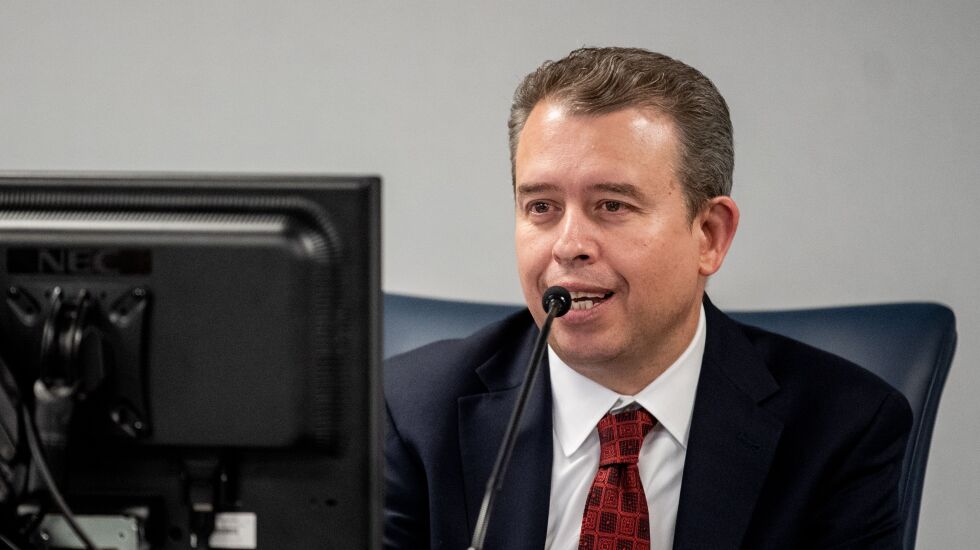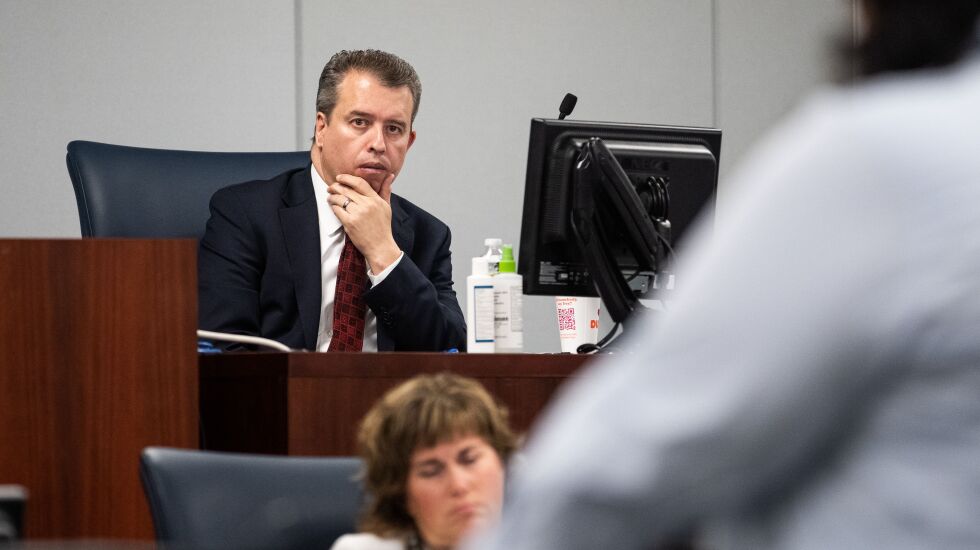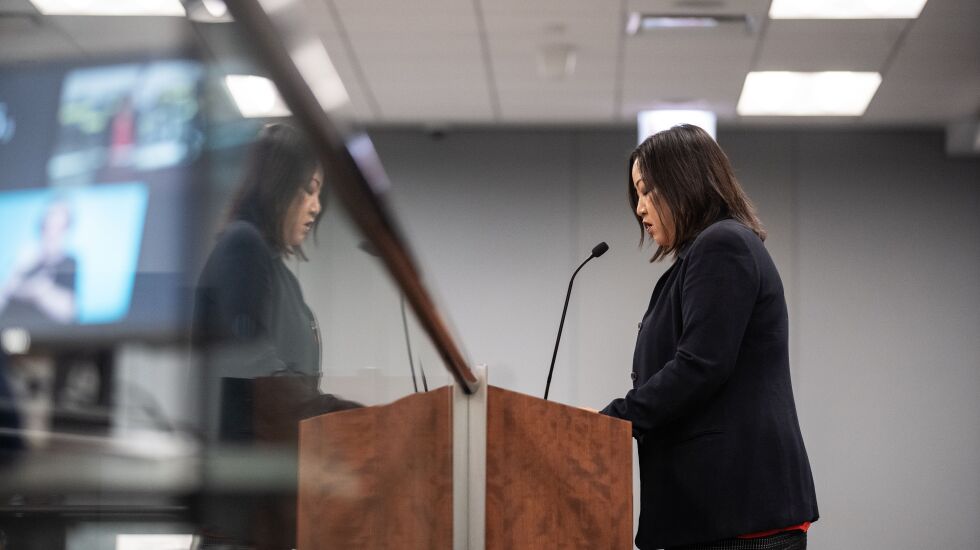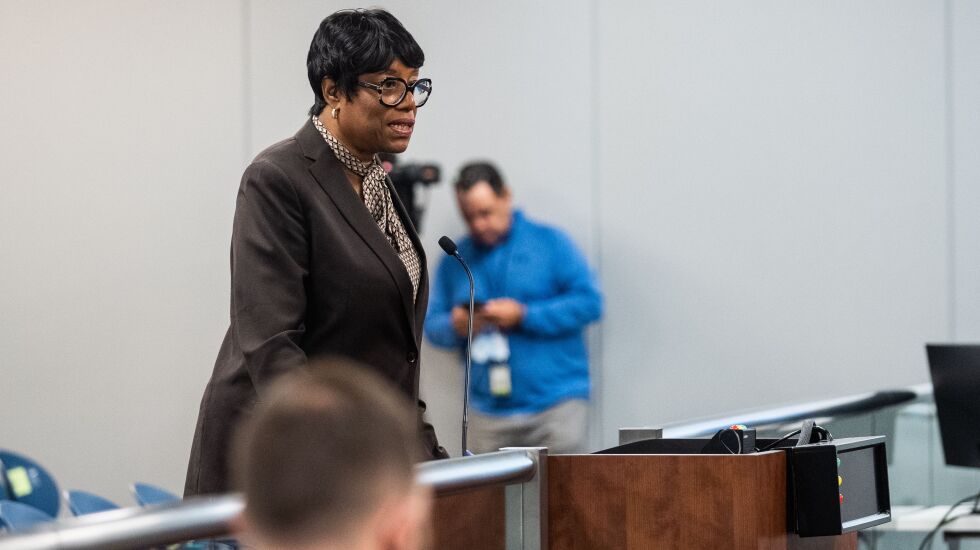
Chicago’s Board of Education on Wednesday narrowly approved key steps toward the construction of a Near South Side high school despite significant opposition from even the strongest advocates for a new neighborhood school.
The school board in a 4-3 vote opted to move forward with leasing former public housing land from the Chicago Housing Authority to build a high school and to acquire another nearby parcel for the CHA in exchange. The district will also ask the city’s Public Building Commission to begin designing the school.
The rare split vote came after heavy debate about the need, viability and fiscal responsibility of the project. Several board members questioned the speed with which the city is attempting to push forward the proposal, with one calling the decision to proceed a “misuse of public money.”
CPS CEO Pedro Martinez said criticism of the plan was “noise” he was trying to move past.
“There’s always going to be challenges; people prefer different locations,” Martinez said at Wednesday’s monthly board of education meeting. But the district has identified 24th and State streets, the former site of the Harold Ickes Homes, as the ideal location to address the community’s needs, he said. He said two other sites considered in the South Loop both had significant drawbacks.
“People have talked about this as an ‘or,’ so either you build a new school or invest in old schools,” Martinez said. “I’ve never seen this as an ‘or.’ For me, it’s always been an ‘and.’ What I see is an opportunity as we’re seeing growth and we’re seeing more investment in our city for all of our schools to get stronger and take part in that.
“I’ve been to Dunbar [Vocational Career Academy] and Phillips [Academy High School], I’ve seen where they’re at today, I see the potential for growth,” Martinez said, referring to two other Near South high schools that have struggled with enrollment. He also said he will announce plans soon to invest in other schools besides the proposed Near South school.

But concerns remain that the construction of a school showered with resources in such close proximity to other Near South Side neighborhood schools already facing dwindling enrollment will introduce competition that they can’t beat, draining them of students and funding.
Board member Elizabeth Todd-Breland harshly criticized the plan. She said the district’s own analysis shows the Near South region is not the city’s highest-need area.
“The thing that’s really making me want to jump out of my body is every time that someone says this is for Black children. Black children were removed from the site that we are talking about,” Todd-Breland said, referencing the closure of the former Harold Ickes Homes.
“I believe if it were not for racism and accommodating the prejudice against going to school with poor students that exists within our communities, we would be talking more broadly about reimagining Dunbar, Phillips, Tilden [Career Career Community Academy], Wells [Community Academy High School] and Jones [College Prep],” she said referring to other area high schools.
The nearby schools are all severely underenrolled, and their advocates hope investments can make them more attractive to the thousands of families in the area currently not choosing to attend. Jones College Prep is a selective-enrollment high school in the South Loop, and changing it to a neighborhood school should not be “untouchable,” Todd-Breland said.

Martinez did not address Jones’ status. But he fired back at Todd-Breland, saying he is convinced the need exists for this high school.
“I have to share with you there is a part of me that, because of housing, specifically in the Black community, that we can actually see growth and that we actually can build a school that prioritizes them. I cannot help but feel that it is aligned to the mission of equity,” he said, noting the school boundaries capture 500 students under 14 years old now living in nearby public housing developments.
“I don’t have the luxury of, unfortunately, saying I am going to fix A, B and C … and then I will get to E. To me, it is all of the above,” Martinez said.
Todd-Breland called for a racial equity impact analysis to be conducted before the project proceeds, echoing a private recommendation made by senior CPS officials last year that went ignored, the Sun-Times and WBEZ reported this week. She also questioned why land was being acquired when the overall project hasn’t yet been approved in a capital budget, calling it “a broken promise and a breach of trust” to move ahead now.
“We don’t know enough to vote for any of these items,” she said. “It feels like a misuse of public money to do this right now.”
Board Vice President Sendhil Revuluri, who also voted no, said the proposal was moving forward outside of a more comprehensive plan for high schools in the city that district leaders promised to present. Revuluri said the district has to acknowledge falling enrollment. CPS has lost about 81,000 students over the last decade.
“If we keep managing each situation in isolation, if we don’t look forward, it won’t lead anywhere good,” he said.
Todd-Breland, Revuluri and member Sulema Medrano Novak voted against the measures. President Miguel del Valle and members Joyce Chapman, Paige Ponder and Michael Scott Jr. voted in favor. Scott is a Lightfoot ally whom she appointed to replace Dwayne Truss over the summer after he showed opposition to the Near South high school.
Scott said a school next to new public housing could help draw more low-income Black families back to the area.
“I think it is unjust to not have a school for a community that is growing in rapid numbers, and a lot of those folks that are in that community are in the African-American minority,” he said, echoing comments made by CHA officials who presented to the board that they are trying to redevelop whole communities rather than only building housing.

State Rep. Theresa Mah, a Chicago Democrat, made waves this week when she said she would block $50 million in state funding for the project that she had pushed through the General Assembly two years ago. Long a supporter of an open-enrollment high school for Near South residents, Mah said the city has not taken genuine community concerns into consideration. She accused Lightfoot and CPS of “manufacturing” support for the school.
“What appears to me is that this project has been seized upon by the mayor as an attempt at an election year win, a feather in her cap at the expense of community members who did not ask to be pawns in her game,” Mah told the school board Wednesday, urging members to vote against building the high school site.
“From the moment I became aware that this location was being considered more than a year ago, I cautioned leaders at CPS and the mayor’s office that it was a divisive idea,” she said. “If the mayor and CPS truly listened to community members, they would understand that it is possible for advocates to be for a new high school but not support the currently proposed site.”
The public comment portion of the meeting also featured several Chinatown advocates who have long fought for a school in the area but are opposed to the way CPS is charging ahead despite concerns.
Grace Chan, executive director of the Coalition for a Better Chinese American Community, said she and her group have advocated for a school to “honor the diverse cultural traditions of the Near South Side and … prioritize immigrant services and bilingual education, which are both needed by the families in this area.”
“What we are opposed to is the proposed location,” she told the board, saying she and other organizations are opposed to using land that is part of the former Ickes Homes site.
“Over the past five months we have repeatedly asked CPS and the city of Chicago to consider other sites so that the promises to the Asian community can be honored,” Chan said.
Angela Lin, co-president of the Chinatown-based community organization People Matter, said the proposal will “divide the community even further among itself.”
“We do a lot of race relations work, and the Chinese and Black communities have a long, deep-rooted history that includes, unfortunately, a lot of tensions. And we’re still trying to heal the tensions between the Chinese and Black communities and between the Ickes community as well as Chinatown.”
A few public speakers showed their support for a new school. Erika Thurman, a parent at Smyth Elementary, said the school’s expected “diversity will help” communities connect to one another. And David Wu, a longtime Chinatown community advocate, said the area needs a new, culturally responsive school that can help keep immigrant students engaged educationally.

Ald. Pat Dowell (3rd) also addressed the board, telling members she was “all in on this project” in her ward.
“The population growth in this area … has been phenomenal,” Dowell said. “A new school in this region is necessary to support all the kids, all the young people, who are now traveling outside of their communities, long distances to attend school.
“I think it’s the right thing to do for our children, and I will work with you in whatever capacity that I can to ensure that there is a Near South high school located in the area that has currently been identified,” she said.
Nader Issa and Lauren FitzPatrick report for the Chicago Sun-Times. Sarah Karp reports for WBEZ.







